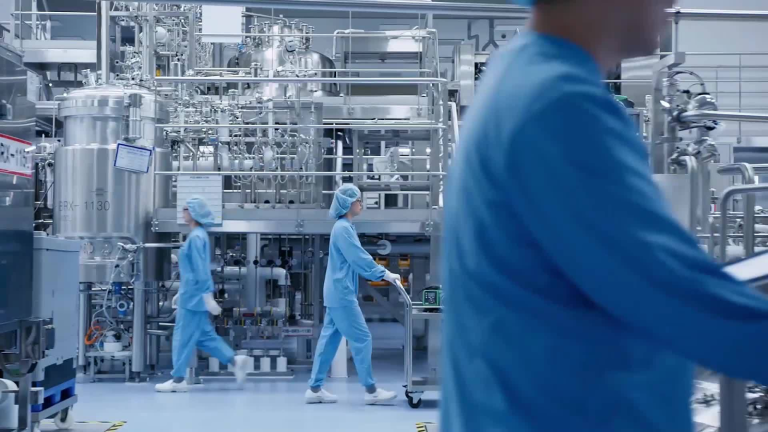Huisub Lim, lead scientist in mRNA technology transfer at contract development and manufacturing organization (CDMO) Samsung Biologics, believes that advances in mRNA vaccine production since the onset of the COVID-19 pandemic could pave the way for innovative drug development and manufacturing opportunities in other areas such as cell and gene therapies.
In a recent roundtable with pharmaceutical industry executives and scientific experts from the world’s leading companies, participants were asked to answer the question: Which trends will have the most impact on drug development in 2022? Lim focused on what advances in mRNA vaccine production will mean for CDMOs and the broader biopharmaceutical industry going forward. He explained that companies that were able to meet the challenge of developing and scaling mRNA vaccine production methods on accelerated time lines during the pandemic have learned from the experience and are now more agile when it comes to working with emerging technologies such as cell and gene therapies.
“Despite the difficulties associated with supporting the manufacturing of this relatively new and unfamiliar technology, some CDMOs rose to the challenge and embraced the learning curve,” said Lim. “They balanced the needs of these new projects with those ongoing by expanding their facilities and capabilities. As a result, these CDMOs are now better placed than ever to support emerging technologies, including cell and gene therapies (C>). Their experience pivoting to accommodate new processes and optimizing them will go hand in hand with their increased capacity to smoothly scale C> manufacturing and development to commercial sizes in the future.”
What Are Cell and Gene Therapies and How Are They Different From mRNA Vaccines?
While experience with mRNA vaccine production will be helpful for CDMOs that want to pivot quickly and effectively to cell and gene therapies, mRNA technology differs from both cell and gene therapies.
Cell therapies involve transferring live, intact cells into a patient with the goal of curing a disease or lessening its symptoms. Gene therapies involve altering the patient’s genetic code to cure or treat a disease, with approved treatments available for conditions such as spinal muscular atrophy, vision loss caused by congenital retinal diseases, and lymphomas.
While mRNA vaccines involve genetic material, they don’t alter the patient’s DNA; rather, they instruct cells to produce a disease-fighting protein. Then, unlike genetic therapies, the mRNA is rapidly degraded by the body.
Though cell and gene therapies differ from mRNA therapies, Lim emphasized that working on mRNA vaccine production during the pandemic has catalyzed forward-thinking companies such as Samsung Biologics to expand capacity, seek portfolio diversification opportunities, and develop processes that can quickly adapt to accommodate new technologies such as cell and gene therapies as they evolve.
Samsung Biologics’ mRNA Vaccine Production Capabilities
In 2021, Samsung Biologics provided fill/finish services for Moderna’s COVID-19 mRNA vaccine, which, along with Pfizer’s COVID-19 vaccine, was the first mRNA vaccine approved for human use. Samsung Biologics didn’t produce the active drug substance in the vaccines but aseptically transferred that substance to vaccine vials in a stringently controlled cleanroom environment to produce a viable vaccine drug product, then provided labeling and packaging.
And the CDMO has now constructed an additional mRNA drug substance facility at its headquarters in Songdo, South Korea. This means it will offer end-to-end mRNA vaccine production capabilities, from the production and cold storage of mRNA drug substances to their transfer to a vaccine, as well as labeling and packaging.
The first project at this new facility is the production of GreenLight Biosciences’ COVID-19 vaccine candidate. But as Lim noted in the roundtable discussion, there’s significant potential for mRNA vaccine production beyond COVID-19 vaccines.
Lim explained: “The use of mRNA vaccines highlighted their massive potential and subsequently led to it becoming the technology of choice for COVID-19 vaccine developers. However, its popularity is not limited to only the COVID-19 market. Its flexibility and effectiveness have made it an attractive option for the treatment and prevention of many other diseases, ranging from cancers to HIV. As of July 2021, there were more than 70 mRNA therapeutics in clinical pipelines globally and many more assets in early development.”
The Future of Samsung Biologics
Samsung Biologics’ decision to expand its mRNA vaccine production capabilities is indicative of the CDMO’s broader strategy of increasing manufacturing capacity while also pursuing portfolio diversification in innovative areas with growth potential.
While Samsung Biologics has yet to pursue cell and gene therapies, its experience in mRNA vaccine production has showcased the agility needed to make such a move in the future if the market for cell and gene therapies evolves.
In addition, Samsung Biologics has made a push toward biosimilars, cost-effective drugs that are similar to biologic reference medicines. In early 2022, the CDMO finalized its full acquisition of Samsung Bioepis, a biosimilars company that it had been operating as a joint venture with Biogen.
And Samsung Biologics continues to focus on expanding its industry-leading manufacturing capacity. It’s in the process of constructing its fourth plant, which is six months ahead of schedule and will commence partial operations at 6 X 10,000 liters in October 2022. When the plant is completed and begins full operations, expected in 2023, Samsung Biologics will provide 620,000L of capacity at its Songdo facilities, making it the largest biomanufacturing hub in the world.
After a productive 2021 that saw Samsung Biologics’ revenue increase by 35% — and a 96% year-over-year revenue increase in the first quarter of 2022 — the CDMO is poised to continue to grow alongside the trajectory of the biopharmaceutical industry. The production of mRNA vaccines looks to be a key capability for fueling that growth and retaining the agility to pursue portfolio diversification.

